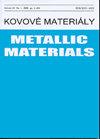Evaluation of welding parameters effects in friction stir welding of AZ31B Mg alloy
IF 0.7
4区 材料科学
Q4 MATERIALS SCIENCE, MULTIDISCIPLINARY
引用次数: 1
Abstract
The joining of magnesium alloys with conventional fusion welding methods often causes porosity and hot cracking defects. The use of friction stir welding, a solid-state welding technique for joining Mg alloys, solves these problems. In this study, AZ31B Mg sheets with 3 mm in thickness were joined by friction stir welding at a constant feed rate (50 mmmin−1) and different tool rotational speeds (900 and 1400 rpm), and different tool tilt angles (0◦ and 1.5◦) using tapered pin. Tensile strength and microhardness tests were carried out to examine the mechanical properties of the welded specimens. The microstructures of the welded zone were analyzed by obtaining optical microscopy and scanning electron microscopy images. According to the tensile test results, specimen welded at 50 mmmin−1 feed rate, 900 rpm tool rotational speed, and 1.5◦ tool tilt angle showed the highest welding strength value 176.03 MPa. K e y w o r d s: friction stir welding, magnesium alloys, welding parameters, microstructure, tensile strengthAZ31B镁合金搅拌摩擦焊中焊接参数影响的评价
镁合金采用传统的熔焊方法连接时,容易产生气孔和热裂缺陷。使用搅拌摩擦焊,一种连接镁合金的固态焊接技术,解决了这些问题。在本研究中,采用恒定进料速度(50 mmmin−1)、不同刀具转速(900和1400 rpm)、不同刀具倾斜角度(0◦和1.5◦)、锥形销连接厚度为3 mm的AZ31B Mg板材。通过抗拉强度和显微硬度试验对焊接试样的力学性能进行了研究。利用光学显微镜和扫描电镜对焊接区进行了显微组织分析。拉伸试验结果表明,在进料速度为50 mmmin−1、刀具转速为900 rpm、刀具倾角为1.5◦时,焊接试样的最高焊接强度值为176.03 MPa。搅拌摩擦焊接,镁合金,焊接参数,显微组织,抗拉强度
本文章由计算机程序翻译,如有差异,请以英文原文为准。
求助全文
约1分钟内获得全文
求助全文
来源期刊

Kovove Materialy-Metallic Materials
MATERIALS SCIENCE, MULTIDISCIPLINARY-METALLURGY & METALLURGICAL ENGINEERING
CiteScore
1.20
自引率
14.30%
发文量
36
审稿时长
3 months
期刊介绍:
Kovove Materialy - Metallic Materials is dedicated to publishing original theoretical and experimental papers concerned with structural, nanostructured, and functional metallic and selected non-metallic materials. Emphasis is placed on those aspects of the science of materials that address:
the relationship between the microstructure of materials and their properties, including mechanical, electrical, magnetic and chemical properties;
the relationship between the microstructure of materials and the thermodynamics, kinetics and mechanisms of processes;
the synthesis and processing of materials, with emphasis on microstructural mechanisms and control;
advances in the characterization of the microstructure and properties of materials with experiments and models which help in understanding the properties of materials.
 求助内容:
求助内容: 应助结果提醒方式:
应助结果提醒方式:


